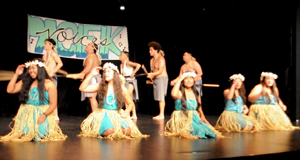
The Micronesian Islands Club performed two ancient Chamorro chants at the Pasifik Voices event. (Photo courtesy of Margery Cercado)
By Margery Cercado
UW News Lab
“We all have diverse voices, and we ourselves are diverse.” Those were the welcoming words from Taylor Ahana-Jamile, director of the Pacific Island Student Commission at the University of Washington (UW).
Taylor was addressing the fifth annual Pasifik Voices event held at the university’s Ethnic Cultural Theatre on Nov. 18. It featured performances, such as signing, dancing, and spoken-word poetry from performers within the local Pacific Islander community.
Taylor said the showcase brought both UW and PI communities together and empowered those from the Pacific. “PISC is here to be an advocate for our PI people not only on campus, but off campus [as well], where we serve to represent their voice and represent their needs and their struggles,” he said.
The commissioner went on to say the focus for PISC this year is solidarity, community, awareness, and leadership. The biggest challenge they will be tackling is to bring Pacific Islander studies to the university.
A number of UW alumni associated with PISC performed at Pasifik Voices, including former PISC Directors Christina Pelesasa and Mario Teulilo. Teulilo opened the show with UW senior and Micronesian Islands Club President Brianne Ramos, chanting a welcome to the audience from the stairs to the stage, where they continued their greeting of respect atop a tapa cloth.
Later, Pelesasa addressed the audience along with Kiana Fuega, a former UW student and Office of Minority Affairs and Diversity employee. The two talked about the origins of the event, which they created in 2008 as a way to make sure Islanders’ talents were presented in culturally relevant ways by connecting with the PI traditions of oral history.
“We originally began planning this as a community reading for the renowned Samoan author Sia Figiel,” Pelesasa said. “However, after much deliberating, we decided a community forum wasn’t enough. We wanted something over the top, fabulous, and amazing that was reflective of our Pacific Islander community.”
In the audience, rows of high school students cheered for their friends who performed. Hosts Taupule Atafua and Genesis Faumuina introduced many of the performers as hailing from Evergreen High School.
Others on stage were from the UW, including members of the MIC. They performed two ancient Chamorro chants, “Chaife” and “Ini Na Latte.”
Marcus Ma, co-vice president of MIC, said that the club is not very well known in the UW’s Pacific Island community and it was important for them to perform since “many people at UW mix up [the Polynesian Student Alliance] and MIC, so by showcasing our culture, you are able to see the differences, yet [also the] similarities between us.”
Another performer was Sagele Tualevao, who sang a rendition of “Can You Feel the Love Tonight” and “My Girl.”
“The minute I heard about this, I wanted to attend,” said Tualevao. “I figured it’s a good way not only to share the talent, but to challenge other people [who] have the voice, the talent, the gift from God, to go ahead and use it.”
Taulevao, who was born blind in American Samoa and has competed in several singing competitions, says events like Pasifik Voices are important. They allow for Pacific Islanders in the community to get together and “acknowledge each other and share whatever gifts people have.” (end)
Margery Cercado is a student in the University of Washington Department of Communication News Laboratory.



